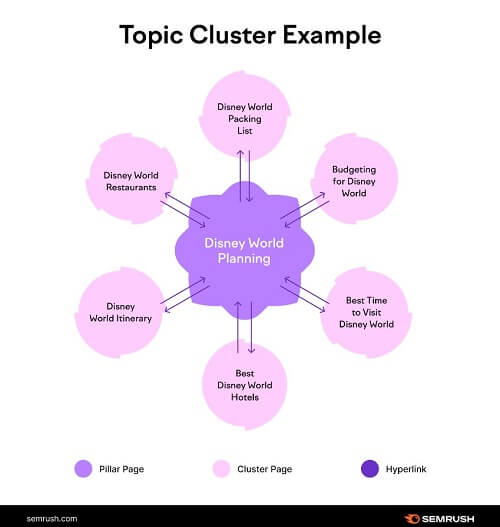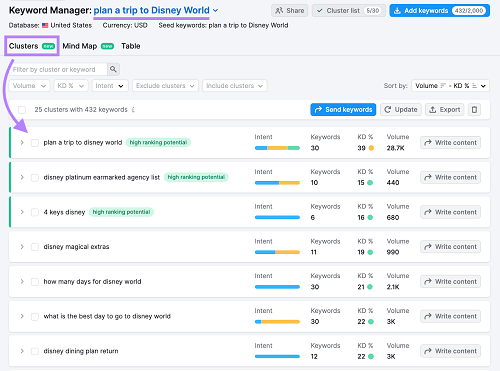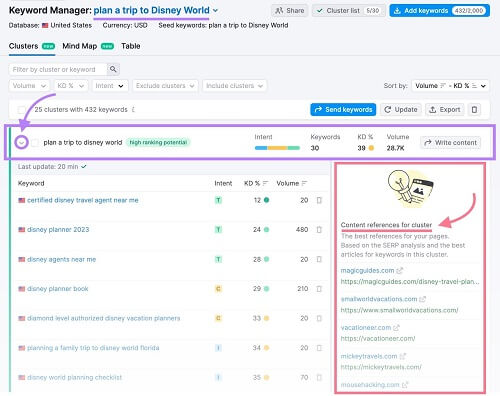How to Use Topic Clusters for SEO
Topic clusters are related content that links back to the main pillar page to create authority for the main page topic. These clusters can help you drive organic traffic.
There are three points to these clusters:
- A main page that has a focused topic – this page needs to cover various user intents but still give way for readers to get more info from supporting pages.
- A cluster of pages that cover related topics to the main topic in more depth. These cluster pages will focus on one specific user intent.
- Linking to and from the related topic pages to the main page gives it authority.

Why are Topic Clusters Important for SEO
Topic clusters give search engines a hierarchy of your website. It also helps to let search engines know whether you have authority on a specific topic. Should the search engines find that you answer queries related to a specific topic, it can lead to better page ranking. The internal interlinking will help with the on-page SEO, and it also helps with engagement on your website. The focus of search engines is less on keywords and more on topics. In the past, they would want to answer a keyword search query.
How to Create a Topic Cluster
Creating a topic cluster is a strategic approach to content marketing that involves organizing related content around a central pillar topic. This helps improve SEO, user experience, and authority in your niche. Here’s a step-by-step guide on how to create a topic cluster:
1. Choose a Main Topic
You must choose a topic that will be your main focus for your cluster. The topic needs to be broad so you can have related pages that will be linked to the main page.
2. Do Keyword Research
Search for keywords that you want to rank for the topic that you have decided on. You will compile a list of keywords you want to target on the page. Also identify specific long-tail keywords related to your pillar topic. These keywords should be less competitive and have good search volume.
You can use the keyword manager of SEMrush to help compile a list of keywords, which can also help find popular topics and subtopics.

Finding Keywords for the Main Page
Clusters are usually built around the keywords that answer the commercial and informational search intent. You should get an average search volume of the keywords for your cluster to get an idea of the potential reach that your page will have.
In the cluster, some of the topics will have “high ranking potential,” which indicates the topic has a high search volume but is not very difficult to rank for. You can also use a topic research tool to find subtopics for your cluster.

3. Create Pillar and Cluster Content
Once you have your cluster, you can create the content. It is always better to start with the main page since it gives you a broader overview of the main topic. When you create the main page, remember the links you want to create from your cluster. After creating the pages, you can move on to the other pages you will be linking to and from. You can use the SEO content template on SEMrush to get suggestions based on your top 10 ranking pages. You can also use the SEO writing assistant to help you improve your content.

4. Check Performance and Keep Working on the Content
You can monitor the pages that you have uploaded to see if the work you have done for them has helped them perform.
You can review and improve if the content needs to be performing better. You can use the various tools that we have to monitor your pages. And to also improve them.
Overview of Cluster Topics
Topic clusters are a powerful and strategic approach to modern content marketing. By organizing content around core pillar topics and creating interconnected clusters of related content, businesses can enhance their online visibility, improve SEO rankings, and provide valuable information to their target audience.
This approach benefits search engines, fosters a better user experience, and establishes thought leadership in each niche. As the digital landscape evolves, embracing topic clusters as a content strategy will likely remain essential for success in the ever-competitive online world.


